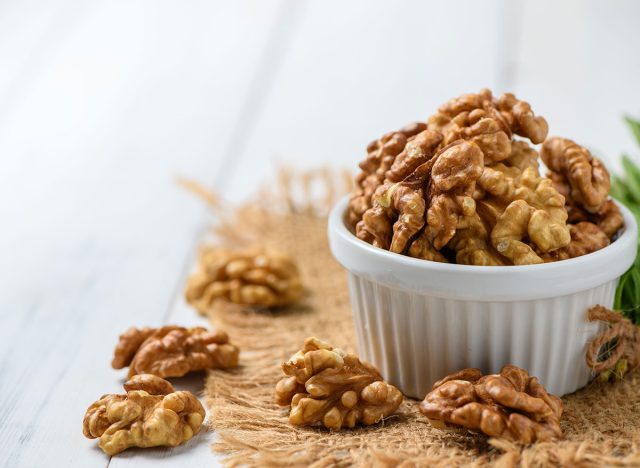Chronic inflammation is a growing issue in the U.S., and this is largely due to the types of food most commonly available to us. Consuming larger quantities of things like added sugars, trans and saturated fats, and other ultra-processed foods, while not getting enough fiber on a daily basis, can all contribute to greater instances of inflammation.
And chronic inflammation, if left untreated, can contribute to various diseases and speed up the aging process. Thankfully, your diet and lifestyle can play a significant role in fighting inflammation.
Continue reading to learn more about eating habits that can help reduce inflammation and slow aging. Then for more healthy eating tips, check out 3 Drinks That May Be Aging Your Brain Faster.


To reduce inflammation in your body and help slow down aging, switching out butter and other saturated fats for olive oil can have a significant impact.
“Olive oil is high in unsaturated fat (monounsaturated fats) which have been shown to reduce inflammatory markers in the blood,” says Rachel Fine, RDN and founder of To The Pointe Nutrition.
According to a study published in Current Pharmaceutical Design, extra virgin olive oil contains phenolic compounds, which are known for helping to reduce inflammatory responses. These phenolic compounds have been found to slow the aging process and help reduce the risk of age-related disorders.


“I recommend including as many antioxidants as possible because they have the best capability of fighting inflammation and cellular damage as we age,” says Morgyn Clair, MS, RDN, author at Fit Healthy Momma.
READ RELATED: New trial will check men for prostate cancer even though they don't have symptoms
According to Oxidative Medicine and Cellular Longevity, antioxidants have the power to prevent and slow down the building of free radicals in the body that are known to cause cellular damage and potentially lead to serious illnesses.
Antioxidants can be found in many different food sources, “with some of the best sources for antioxidants being richly-colored fruits and veggies like kiwi fruit, spinach, pomegranates, kale, and others,” says Clair.


“Avocados are another addition I suggest because they’re rich in antioxidant polyphenols and vitamin E,” says Fine, “and vitamin E is a potent antioxidant that acts as a direct scavenger of oxidants, which are natural byproducts of metabolism.”
According to one study, the antioxidant content of vitamin E has been shown to reduce age-related cognitive decline and contribute to improved overall cognitive performance. Vitamin E has also been found to have potential anti-inflammatory properties because of its antioxidants.
“And last, avocados contain a small amount of the carotenoid lutein, which might support reductions in age-related macular degeneration,” says Fine.


Last but certainly not least on the list is adding walnuts to your daily eating habits. “Walnuts are high in a type of omega-3 fatty acid called alpha-linolenic acid (ALA), which the body can convert into EPA and DHA-the two essential nutrients for brain development and functioning,” says Fine.
You can incorporate more walnuts by adding some to your oatmeal or yogurt in the morning, using them as a salad topping at lunch, or snacking on a handful during an afternoon break.
Source:










